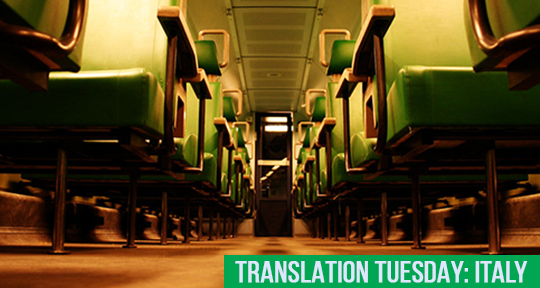This week’s Translation Tuesday features the work of Italian poet Maria Borio. This translation of Borio’s work is deft, bringing out the implausibly smooth staccato of the original Italian. The mix of rhythm and flow in the poem is incapsulated by the symbol of the train that cuts and blows as it glides. Here, the movement of images works to push the boundaries of the movement of thoughts: brackets set off points of views that read almost like cinematic direction, suggesting that the pure movement of the verse—and thought—are always conditioned by some perspectival imposition. Come aboard Maria Borio’s powerful train of thought.
Perspective
The horizon line seemed the border of the world
halted midst your pole and the sea. The sea curving since
the earth is a globe, suspended between nose and horizon hands
fist fight, thrusting images of inconsistency against
[the horizon.
Now in one two-hour trip you cut the country in half
passing blade-edge through northern haze and centre
quattrocento blue, the Piero della Francesca fresco
I would like transparent, its perspective over the world.
But today in the volcano people run granulated after a
[vanishing
point that is internal, cornea to pupil, fine red mists
spraying up electric; but the need for truth must surely
[run
like train’s sharp blade cleaving us lone from ourselves
(me, us?) and as it runs I see you in an empty house still
parallel-fisted thrusting images making swarms
of insects and dust. Behind the window-glass dawn has
[cut
the courtyard: the shadows of dried clothes run up the walls, a
[perspective
that their borders invert onto one another as they age
[like the planet’s poles
joined and opposite snatching away horizon from one
[another.
In dawn’s cutting glass the train blade is an
[aerial perspective.
Fragile beings have eyes that touch.
Translated from the Italian by Julia Anastasia Pelosi-Thorpe
Maria Borio is an Italian poet and poetry editor of the journal Nuovi Argomenti. Borio has academic publications on Italian poetry, and Transparency is her second poetic collection, in addition to the poems that have been published in larger collections and journals. The traversal of borderlines initiated in her first collection, L’altro limite, is continued here, where boundaries between humans are semi-opaque, flickering, hybrid.
Julia Anastasia Pelosi-Thorpe is an Italo-Australian translator completing her MA in Italian Studies, where she is writing on the ventriloquism of voice in seventeenth-century Italian poetry. She also works as a language teacher with Latin and English and as a research assistant in the digital and computational humanities.
*****
Read more on the Asymptote blog:

